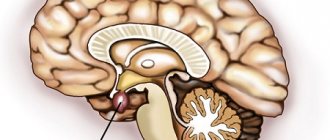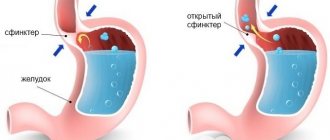Alcoholic drinks are in very high demand among the domestic population. We drink alcohol in cafes, bars and restaurants, bring it home and drink it at family celebrations, take alcohol with us when going out of town, etc. This product is very popular, but at the same time it poses a threat to your health; we ourselves consume poison, which gradually kills us. Some people do this carefully and in small doses, while others drink a lot and get alcohol poisoning, which has a very bad effect on their well-being and health in general.
In fact, alcohol poisoning is more than common. If you do not follow the dosage and get carried away with alcoholic beverages, then you can drive your body into a crisis situation and it will be quite difficult to get out of it. Your body always produces alcohol in your stomach after eating any food. Naturally, alcohol in the body can increase to 0.4 ppm; this figure is considered normal and does not pose any threat to your health.
If a large amount of alcohol enters the body, which is always filled with alcohol, then the liver simply cannot cope with its work and does not have time to cleanse the blood. The blood alcohol level rises, you feel sick, you suffer for more than one day and think about what medications can help in this situation.
Causes and risk factors
There is only one reason for alcohol intoxication – excessive alcohol consumption. Normally, two types of liver enzymes with different metabolic activities are responsible for the breakdown of ethyl alcohol molecules - alcohol dehydrogenase and acetaldehyde dehydrogenase. Alcohol dehydrogenase oxidizes ethanol to acetaldehyde, which is further metabolized by acetaldehyde dehydrogenase to harmless acetic acid.
The efficiency of ethanol breakdown varies widely depending on genetic factors, gender, age, health, body type and environmental conditions. The lower the activity of alcohol dehydrogenase and acetaldehyde dehydrogenase, the stronger the individual's predisposition to alcoholism and alcohol intoxication. The action of enzymes weakens against the background of malnutrition, chronic stress, lack of sleep, high strength and low quality of alcohol, etc. As a result, the concentration of pure ethanol and acetaldehyde in the bloodstream quickly reaches a critical level, as a result of which signs of intoxication appear even when consumed small doses of alcohol.
The only cause of alcohol intoxication is excessive alcohol consumption
In men, the content of alcohol dehydrogenase is on average higher than in women, and in children and adolescents it is an order of magnitude lower than in adults. Ethnicity also matters: in some peoples, more advantageous combinations of alleles of genes encoding the structure of alcohol dehydrogenase and acetaldehyde dehydrogenase are more common, while in others, genetic combinations are less successful.
Acute alcohol poisoning can provoke exacerbations of chronic diseases, hypertensive crises and acute cerebrovascular accidents.
How does alcohol poisoning occur?
The severity of intoxication and the likelihood of poisoning depend on many factors: gender, age, weight of a person, the connection between alcohol intake and food intake, genetically determined characteristics (for example, the activity of the enzyme that breaks down alcohol, the body’s tolerance), the amount of drink, its type, quality and strength.
The time of distribution of alcohol throughout the body and the onset of the effect of intoxication is approximately known. On average, the time during which alcohol distributes in uniform concentrations in the systemic circulation is 1–3 hours. Therefore, the same volume of alcohol drunk over different times has different effects on the body. For example, in a middle-aged adult man without concomitant pathology, a bottle of vodka drunk within 4-5 hours will cause persistent intoxication, and within 1-2 hours - acute moderate or severe poisoning.
However, it is impossible to accurately predict in advance the likelihood and degree of intoxication in a particular case, since the rate of neutralization and elimination of alcohol is individual and depends on the condition of the excretory organs (kidneys, liver).
According to average data, acute intoxication occurs when the concentration of ethyl alcohol in the blood is equivalent to 100-150 ml of anhydrous alcohol for a person who does not regularly drink alcohol-containing drinks. The lethal dose in terms of 96% ethanol is approximately 250-300 ml.
The lethal dose for surrogates is much less - for example, taking methyl-containing drinks in a volume of 30-100 ml (in terms of pure alcohol) ends in the death of the victim.
Forms
Depending on the nature and duration of alcohol consumption, acute and chronic forms of alcohol intoxication are distinguished. When a large amount of alcohol enters the body once, a person who does not regularly drink alcohol experiences acute alcohol intoxication, in which the pathological process is localized primarily in the nervous system.
Occasionally, when drinking alcohol, even in insignificant quantities, some people develop pathological intoxication, characterized by a complete loss of self-control and a rapid increase in psychotic symptoms. The patient may be haunted by hallucinations, and in some cases unmotivated aggression occurs. Being in an altered state of consciousness, the patient may commit an offense. The attack ends in deep sleep, and after waking up the person does not remember what happened.
Against the background of long-term alcoholism, a dangerous pathological condition develops - chronic alcohol intoxication, accompanied by damage to internal organs and systems. Typical manifestations of chronic alcohol intoxication include:
- arterial hypertension;
- tremor;
- arrhythmia;
- myocardial dystrophy;
- chronic diseases of the gastrointestinal tract and genitourinary system;
- chronic hepatitis and pancreatitis;
- fatty hepatosis;
- muscle atrophy;
- cerebrovascular accidents – up to cerebral ischemia and micro-strokes;
- alcoholic encephalopathy;
- delirious disorders.
Against the background of chronic alcohol intoxication, in some cases alcoholic epilepsy and delirium develop - an acute psychotic state accompanied by delusions, stereotypies and frightening hallucinations, which is popularly called delirium tremens.
What not to do
When you are near someone who has been poisoned, do not do the following under any circumstances:
- Do not leave a person unattended;
- Do not try to place the victim on his back or leave him lying on his back;
- Do not lift the person to his feet or force him to move;
- Do not pour cold water on the patient;
Stages
Depending on the concentration of pure ethanol in the bloodstream, three degrees of acute alcohol intoxication are distinguished.
- Blood alcohol content is less than 0.2%. Manifestations of intoxication are similar to signs of mild intoxication; medical assistance, as a rule, is not required.
- The blood alcohol level rises to 0.2–0.3%. Signs of damage to the central nervous system are increasing: coordination of movements sharply deteriorates, speech becomes incoherent and illegible, facial expressions lose expressiveness; dizziness and double vision appear; After an attack, a hangover syndrome develops.
- When the ethanol content in the blood exceeds 0.3%, the patient’s life is threatened. Due to severe depression of central nervous system functions, respiratory disturbances and arrhythmia are observed; there is a high probability of developing alcoholic coma and cardiac arrest.
Stages of alcohol intoxication
What to do in case of poisoning
If you have studied all the possible symptoms of alcohol poisoning and witnessed a similar incident, your first priority will be to call an ambulance. Alcohol poisoning is very dangerous for the patient’s life, so everything must be done to save him. You should not be biased towards a person and say that he is an alcoholic and is to blame for what happened. Poisoning with low-quality alcohol may have occurred; perhaps this is the first time a person has become heavily intoxicated. In any case, first aid will be the decisive factor in saving the person.
On the Internet you can find a huge number of folk methods, where they tell you that acute alcohol poisoning can be cured with the help of available drugs and substances. But, in fact, you can harm the patient and lead him into an even more difficult situation. Therefore, it is impossible to do without professional doctors.
If nothing is done, then the next stage of alcohol intoxication occurs, the person becomes worse, new symptoms appear and treatment must be changed. Without proper experience, you will not be able to do all this.
The problem is that it is not always possible to call specialists, and help must be provided now. Also, some people try to treat the symptoms of alcohol poisoning at home, so you need to know how to do it correctly.
Symptoms of alcohol intoxication
The signs of mild to moderate acute alcohol intoxication are familiar to many first-hand:
- euphoria and emotional disinhibition;
- facial hyperemia;
- sweating;
- muscle tremors;
- nausea and vomiting;
- dilated pupils;
- increased thirst;
- dizziness and severe headaches;
- inhibited facial expressions and gestures;
- fluent, unintelligible speech;
- impaired concentration and slow reaction;
- uncoordinated movements and unsteady gait;
- loss of ability to objectively assess the situation.
With severe alcohol intoxication, loss of consciousness occurs
Severe alcohol poisoning is accompanied by severe depression of central nervous system functions. Particularly dangerous is inhibition of the respiratory and vasomotor centers, which is manifested by obstructive breathing disorder, tachycardia and a sharp drop in blood pressure, sudden cardiac arrest. Symptoms of severe alcohol intoxication include loss of consciousness, memory disturbances, jaw spasms, seizures, changes in muscle tone and tendon reflexes, and inability to control urination and bowel movements. The size of the pupils is not constant, but tends to decrease, the reaction to light is weak, one pupil may be larger than the other. A patient in this condition should call an ambulance or take the victim to the hospital to avoid death.
Symptoms of poisoning
There are 3 degrees of alcohol poisoning: mild, moderate and severe.
For mild poisoning:
- the skin is hyperemic;
- the person is excited, in a euphoric, active mood;
- some character traits are exaggerated (for example, excessive generosity or stinginess, increased conflict, a sad-angry mood or decreased criticism, a positive attitude towards others, including strangers);
- self-control decreases, self-esteem increases;
- motor incoordination is observed.
If alcohol intake is stopped at this stage, the consequence of mild poisoning will be a hangover.
Moderate alcohol poisoning:
- intellectual processes slow down;
- speech becomes confused and unintelligible;
- orientation in time and space is impaired;
- Dyspeptic disorders appear (pain in the stomach, nausea, vomiting, diarrhea), drowsiness develops.
When you stop drinking alcohol, deep sleep usually occurs, sometimes first aid is necessary, the condition returns to normal after 12–24 hours.
In case of severe poisoning:
- the victim is unconscious and does not respond to tactile and painful stimuli;
- the functions of the respiratory and cardiovascular systems are inhibited (interruptions in breathing, shortness of breath, rare thready pulse, drop in blood pressure);
- body temperature decreases.
In this case, qualified medical assistance is necessary, because severe intoxication can be aggravated by alcoholic coma, and in the absence of medical care - death.
Poisoning is possible not only with ethyl alcohol, but also with other alcohols used for the production of surrogates. Most often, methyl or wood alcohol is used for these purposes, poisoning with which is deadly. In this case, pathological intoxication occurs, the degree of which does not correspond to the amount of alcohol taken.
The main symptoms of methanol poisoning are similar to those described above, with the difference that 2–4 days after taking it, visual impairment develops, which can be irreversible (double vision, blurred vision, blindness).
Source: depositphotos.com
Features of the disease in children
Children can be exposed to alcohol intoxication even in the prenatal period. Regular consumption of alcohol by a pregnant woman leads to systemic disturbances in the intrauterine development of the fetus. Due to alcohol intoxication in the womb, newborns experience multiple congenital physical and mental pathologies, classified as fetal alcohol effects or fetal alcohol spectrum disorders (FASD).
The severity of FASD in each specific case is not the same, since it is influenced by a number of factors - the frequency and volume of alcohol consumption, the quality and strength of alcoholic beverages, the state of the mother’s health, the environmental situation in the region, socio-economic conditions, etc. The most common A manifestation of FASD is considered to be fetal alcohol syndrome (FAS), also known as fetal alcohol syndrome (FAS), fetal alcohol syndrome, or fetal alcohol fetopathy. In pediatrics, three criteria for diagnosing FAS are accepted:
- pre- and postnatal deficits in height and body weight;
- neurological abnormalities: anatomical defects in brain structures, mental retardation, memory and attention disorders, low learning ability and weakened control of emotions;
- characteristic features of the structure of the face and skull: microcephaly (reduction in the volume of the cranium), cleft palate (the so-called “cleft lip” and “cleft palate”), underdevelopment of the jaws, a wide flat bridge of the nose, a narrow and short palpebral fissure, epicanthus (skin fold at the inner corner of the eye), smoothing the philtrum.
In some cases, sick children have congenital heart defects, abnormalities of the joints and genital organs, disorders of fine motor skills, hearing and vision, and capillary hemangiomas. The patient needs social support and medical supervision throughout his life; he is at increased risk of marginalization and the development of severe alcohol dependence.
Consequences and treatment after poisoning
As a rule, mild alcohol poisoning remains without consequences. Repeated poisoning or severe alcohol intoxication can cause damage to the brain, liver and kidneys. In especially severe cases, alcohol intoxication leads to death.
Pregnant women should definitely abstain from any alcohol, as its consumption can lead to serious developmental problems in the child.
Diagnostics
In case of acute alcohol intoxication, the diagnosis is made situationally: external signs of intoxication and the smell of alcohol emanating from the patient are sufficient. To clarify the diagnosis, the Rappoport test is used to detect ethyl alcohol in exhaled air.
To accurately determine the concentration of alcohol in the blood and urine, Karandaev’s photometric method is used - a redox reaction between ethanol and potassium hydrochromate with the formation of chromium sulfate. Determination of alcohol content in other biological media is carried out through serial photometric research, including up to ten analyses. The enzymatic ADN method and gas-liquid chromatography can be used as auxiliary techniques.
The Rappaport test allows you to determine the level of ppm in the body
The chronic form of alcohol intoxication is most often discovered during examination of a patient with concomitant diseases.
First aid
First aid actions depend on the degree of intoxication. Doctors are not sought if the degree of ethanol poisoning is mild or moderate. To alleviate the condition of the victim, it is necessary to carry out a number of measures that can remove ethyl alcohol and its metabolites from the body.
When the person is conscious, the following manipulations should be performed:
- rinse the stomach;
- Brew strong tea and give it to the patient to drink;
- clear the airways of vomit;
- apply a cold compress to your forehead;
- give some sorbent.
If after poisoning a person remains unconscious, it is necessary to call for medical help. Before being examined by a specialist, it is recommended:
- remove tight clothing;
- let it breathe with ammonia;
- turn the victim on his side, placing a cushion under his head;
- do not leave unattended;
- Avoid overheating or hypothermia.
An unconscious patient should not have his stomach lavaged, otherwise he will choke on vomit.
In case of cardiac arrest caused by severe poisoning, it is necessary to carry out resuscitation actions: chest compressions and artificial respiration.
Treatment of alcohol intoxication
In most cases, mild to moderate alcohol intoxication can be dealt with on your own. First, you should induce vomiting by pressing on the root of the tongue, and then drink as much water as possible and take enterosorbent to quickly remove toxic metabolites of ethyl alcohol from the body.
If signs of severe poisoning appear, treatment of alcohol intoxication should be carried out in a hospital setting. While waiting for the ambulance team to arrive, the victim must be placed on his side and his head raised to prevent asphyxia by vomit. In the hospital, detoxification therapy is carried out - gastric lavage and intravenous infusions of detoxification solutions, and in case of alcoholic coma, tracheal intubation and artificial ventilation are performed.
After acute symptoms are relieved, a drug therapy regimen is selected for each patient, which includes, according to indications:
- psychotropic drugs: antipsychotics, tranquilizers, psychostimulants and analeptics;
- anticonvulsants;
- antispasmodics;
- vitamins: thiamine chloride, nicotinic and ascorbic acid;
- hepatoprotectors.
In case of alcohol intoxication, the body is detoxified
As a rule, normalization of the patient’s condition can be achieved within 5–7 days. Detoxification therapy for chronic alcohol intoxication occurring against the background of alcoholism is carried out simultaneously with psychotherapeutic measures aimed at overcoming addiction.
Treatment with folk remedies
Traditional medicine can also be of great help in treating alcohol poisoning. Such recipes are used not only to treat the poisoning itself, but also to relieve intoxication in the body.
Honey water
To prepare the solution you will need water and honey. A few spoons of honey need to be added to warm boiling water. You need to drink as much as possible. This will help restore water and electrolyte balance, since honey contains a large amount of fructose. This honey water helps relieve symptoms of intoxication and alleviate hangovers. The total amount of honey drunk should be at least 150 grams, only in this case the therapy will be effective.
Saffron infusion
To prepare, you will need 1 tablespoon of saffron powder and 2 glasses of water. The water must be brought to a boil, and then pour in the powder. Leave to infuse until the infusion has cooled. Should be consumed in small sips. Taking it after vomiting and the patient’s recovery after poisoning helps a lot.
Lemon juice
To prepare, you will need half a lemon and 1 teaspoon of sugar. You need to squeeze out the juice from the lemon halves and then add sugar. Mix all this and drink slowly. This will help eliminate intoxication and normalize blood sugar levels.
Possible complications and consequences
Acute alcohol poisoning can provoke exacerbations of chronic diseases, hypertensive crises and acute cerebrovascular accidents. Against the background of chronic alcohol intoxication, in some cases alcoholic epilepsy and delirium develop - an acute psychotic state accompanied by delusions, stereotypies and frightening hallucinations, which is popularly called delirium tremens. In the absence of medical supervision, in cases of fainting and coma, there is a possibility of death due to cardiac arrest, asphyxia by vomit; If stomach contents enter the respiratory tract, aspiration pneumonia may develop.
Children can be exposed to alcohol intoxication even in the prenatal period. Regular consumption of alcohol by a pregnant woman leads to systemic disturbances in the intrauterine development of the fetus.
Possible consequences
Drinkers experience complications of chronic diseases and the emergence of new ones:
- acute toxic hepatitis;
- acute liver failure;
- chronic pancreatitis;
- alcoholic delirium;
- Mendelssohn's syndrome is a condition in which suffocation develops in the respiratory system due to the entry of gastric secretions into the passage.
Prevention
Absolute protection from alcohol poisoning is provided only by complete abstinence from its use, but the majority of the population does not consider this option due to cultural traditions. To reduce the harmful effects of ethanol on the nervous system, it is recommended to limit yourself to minimal portions of alcohol, avoid drinking low-quality alcohol and not mixing different drinks. Considering that during hypoglycemia, the efficiency of ethanol utilization is an order of magnitude lower than normal, you should avoid drinking on an empty stomach, and during a feast, combine alcoholic drinks with foods rich in proteins and carbohydrates. In stressful situations, after illnesses and when you are very tired, it is better to abstain from alcohol - the body’s reaction to alcohol in such cases can be unpredictable.
Video from YouTube on the topic of the article:
What kind of alcohol can cause poisoning?
Methyl alcohol poisoning
Poisoning occurs as a result of drinking ethyl or methyl alcohol, low-quality vodka and moonshine. Cosmetics (cologne, lotion) and technical fluids (wood alcohol, brake fluid) lead to severe poisoning. An alternative to dietary liquids is tincture of hawthorn and red pepper. Ethanol partially neutralizes the body, and an overdose threatens a person with death. In case of severe poisoning, call an ambulance.
Only a doctor can correctly prescribe medications that treat alcohol poisoning.
treatment
Treatment for alcohol poisoning usually involves supportive care while your body rids itself of alcohol. Typically this includes:
Preventing breathing problems or choking
Adults and children who have accidentally consumed methanol or isopropyl alcohol may need hemodialysis, a mechanical way of filtering waste and toxins from your system, to speed up the removal of alcohol from their bloodstream.
What happens to the body during mild poisoning
With moderate consumption of alcoholic beverages, the body is able to cope with the consequences on its own. The liver produces an enzyme that processes harmful substances, eventually removing them out.
This substance further decomposes into water and carbon dioxide, which do not pose a danger to the body.
However, a blow to the nervous system occurs even with mild intoxication. As everyone knows, health is practically not restored. Therefore, even a mild but constantly repeated state of intoxication can lead to the development of nervous diseases.
What is alcoholic coma
Initial - blood alcohol content is 0.5-1.5 ppm;
Moderate - up to 3 ppm;
Extremely heavy - more than 3 ppm.
- After gastric lavage, you need to sleep, preferably at least 8 hours
- First of all, it is necessary to clear the stomach of alcohol that has not yet been absorbed. Gastric lavage is done with clean water. You can use a slightly pink solution of potassium permanganate or add a few drops of ammonia to the water. Water is poured through a probe and then pressed on the root of the tongue. The person must sit or lie with his head raised and turned to the side, otherwise he may choke on vomit. In this case, intoxication can be reduced with the help of activated carbon, which absorbs toxin molecules, which also helps prevent them from entering the blood.
- After the procedure he needs to get some sleep. How long will it take for him to come to his senses? As a rule, after 8 hours of sound sleep, a person sobers up completely, and the consequences of poisoning (hangover) continue for up to 1 day, if he is not a chronic alcoholic.
- When you are hungover, you need to drink a lot of fluids (water, tea, milk) to eliminate the effects of dehydration and speed up the elimination of remaining toxins through the kidneys.
- In case of fainting, if the intoxication is severe, he is given ammonia to sniff.
- If signs of coma appear, you must call an ambulance. In case of cardiac arrest, without waiting for the ambulance to arrive, it is necessary to perform indirect cardiac massage.
In the hospital, first of all, a person is brought to consciousness and given drugs that stimulate the heart and blood circulation. They cleanse the stomach and give diuretics. To cleanse the blood, a solution containing glucose, vitamins and sodium chloride is injected into the patient using a dropper.
At the same time, if intoxication is extreme, drugs are administered that enhance the production of enzymes that break down toxins to speed up detoxification. Hepatoprotectors (means to protect liver cells), as well as psychotropic drugs that normalize a person’s mental and emotional state, are used.
- Alcohol destroys the liver. As a result, a person experiences irreversible damage to liver tissue
- Alcohol destroys the liver. As a result, a person develops chronic hepatitis and liver cirrhosis (irreversible tissue damage).
- Due to the effects of ethyl alcohol during alcoholism, intoxication disrupts the structure of the heart muscle. As a result, arrhythmia, hypertension, and coronary heart disease occur, which often leads to stroke and heart attack.
- Alcohol irritates the walls of the stomach, after which it becomes impossible to digest food. Exhaustion occurs, vitamin deficiency, and stomach ulcers occur.
- Damage to the brain and central nervous system leads to loss of memory, coordination of movement, reflexes, and neuropsychiatric diseases.
Primary alcohol poisoning includes a state of euphoria, which manifests itself in impaired coordination of movements, altered perception of reality, and changes in behavioral patterns. What is commonly called a hangover already refers to the secondary process of intoxication, when the body tries to independently remove decay products.
Chronic
For people who do not consider themselves alcoholics, but drink alcohol daily, chronic alcohol intoxication is typical (the “stomach fermentation” syndrome, when ethyl is independently produced in excess quantities, is not considered). In practice, this is total damage to all internal organs from the gastrointestinal tract to the brain.
- body weight imbalance (both excess weight and unnatural thinness are possible);
- early degree of arterial hypertension;
- constant tremor of the limbs;
- redness of the skin;
- respiratory system disorders;
- a feeling of severe chills or heat, which alternate in waves;
- anemia;
- peripheral nerve damage;
- excessive sweating.
Acute
A single dose of 300-400 ml of ethanol or a proportional amount in a short period of time can lead to death, but in most cases acute alcohol intoxication occurs, which can be eliminated with timely medical care. Typical signs of severe alcohol poisoning are considered to be: excessive salivation, convulsions, intense redness of the face and palms, problematic breathing, loss of consciousness or a borderline state.
If we take into account the psychological causes of poisoning, then it should be noted that drinking alcohol against the background of altered emotional consciousness (stress or extreme joy) leads to an incorrect perception by the body of the effect of ethyl on the brain. In this case, intoxication does not occur for a long time, but the person continues to strive for it. At this rate, much more alcohol enters the body than the drinker often allows himself.
Alcohol (acetaldehyde) poisoning can occur even when drinking, for example, one glass of vodka. It all depends on the quality of the drink, the body’s personal tolerance, duration and speed of consumption. In fact, alcohol intoxication occurs due to the decomposition of ethyl alcohol by the liver and the redistribution of organ efforts to get rid of the breakdown products.
Separately, it is worth highlighting poisoning with alcohol not intended for internal consumption: denatured alcohol, methyl alcohol and counterfeits of unknown composition. In this case, fusel oils enter the body, frankly poisonous components that are not intended for consumption due to their toxic characteristics.
- Poisoning and cell death. Pure ethanol actively kills living tissue, which is why it is used as a universal antiseptic. The widely held belief that alcohol kills brain cells is not entirely true. Exposure to acetaldehyde disrupts neural connections, but only in exorbitant quantities leads to cell death.
- Sexual dysfunction. For the most part, this applies to men. Sperm formation occurs within 75 days. Exposure to alcohol disrupts normal spermatogenesis and leads to the development of defective sperm, so it is recommended to give up alcohol for about 3 months if you plan to conceive a child. Damage to eggs in women, although they are more reliably protected, occurs with chronic alcoholism, since the egg volume is present in the body from birth.
- The fetus in pregnant women may develop abnormalities due to improper functioning of the mother’s organs and systems due to alcohol damage.
- The brain loses normal oxygen supply, neural connections are disrupted, which leads to gradual degradation of mental capabilities, decreased intelligence, and the development of dementia.
- The heart and blood vessels begin to wear out faster than nature intended. The consequences of chronic alcohol consumption are hypertension, heart rhythm disturbances, coronary disease, and heart attacks.
- The gastrointestinal tract suffers from the destruction of mucous membranes by alcohol, peptic ulcers, gastritis develop, and the salivary glands are damaged.
- The liver is the main organ where the body breaks down alcohol and begins to remove it from the system. Ethyl disrupts normal functioning and leads to tissue death.
- The kidneys lose their ability to normally remove waste products. Their improper operation leads to an excess of fluid with residues from the breakdown of alcohol in the body.
- CNS. Depending on the intensity of use of ethyl-containing substances, a whole range of problems can develop: from anemia, muscle dysfunction to complete or partial paralysis.
- The immune system is weakened due to a decrease in the production of leukocytes and a general inhibition of body functions by alcohol.
- euphoria and delirium;
- hallucinations, visual disturbances;
- decrease in body temperature;
- impaired coordination of limbs, perception of body position in space;
- lowering the threshold of the self-preservation instinct;
- incoherent speech, slower thought processes;
- diarrhea;
- low blood pressure;
- dizziness;
- tremor of hands and feet;
- chills;
- paleness of the skin of the body, against the background of redness of the face;
- general malaise;
- frequent urge to urinate;
- pain in the right hypochondrium;
- nausea, vomiting.
We suggest you read: How to relieve alcohol intoxication at home
Vodka
Vodka intoxication manifests itself in the same way in all patients, with variations depending on the individual characteristics of the body. Often manifested by aching, nagging pain in the abdomen, diarrhea, vomiting, delirium tremens with a sudden stop in the intake of alcohol, dizziness. In critical cases, vodka poisoning of the body leads to an alcoholic coma, which requires immediate hospitalization.
Ethyl alcohol
If we talk about alcoholic products that are classified as food products, the symptoms of poisoning were described above. Further, it all depends on the person and the type of alcohol. For example, the liver of an average adult man will completely neutralize 0.5 liters of beer in about 1 hour. Exceeding this dose leads to the toxic effects of alcohol.
- stop drinking alcohol;
- give access to fresh air, make breathing easier;
- cleanse the stomach of any remaining alcohol that has not yet been absorbed into the blood;
- take any sorbent according to the instructions (activated carbon, Medichronal or similar drugs);
- give a saline laxative;
- feed with enveloping food (jelly, viscous porridge like oatmeal).
- ensure fresh air enters the room;
- induce vomiting to get rid of the remaining alcohol (for example, drink a solution of potassium permanganate, ammonia-anise drops or 1 teaspoon of powdered mustard per 1 cup of water);
- give a cotton swab soaked in ammonia a sniff (you need to use this method carefully so as not to poison the victim);
- drink hot tea with a little sugar.
IV drip at home
An alcohol intoxication drip quickly removes acetaldehyde and related breakdown products from the blood. The main thing is that next to the victim there is a person with minimal paramedic education. The solution itself can be purchased at any pharmacy: 5-10% glucose saline solution. In severe forms of alcohol poisoning, doctors use detoxifiers and hepatoprotectors.
Urgent Care
- You need to drink as much water as possible (at least one liter), and then induce vomiting 3-5 times, since most of the alcohol taken orally is absorbed in the stomach.
- When the stomach is cleared, you need to drink water again, because alcohol greatly dehydrates the cells. Please note that if you have kidney disease, this advice must be followed very carefully!
- Additional purification is carried out using sorbents (activated and white carbon). Alcohol poisoning can also be alleviated with the drug Enterosgel, which successfully relieves the symptoms of intoxication within an hour.
- In order to help the liver, which is greatly damaged by excessive drinking, you need to take amino acids. Such drugs include Glutargin.
- violation of movement coordination;
- lethargy, impaired concentration;
- eyes become shiny;
- dizziness;
- speech disorders - the voice becomes loud, speech is slurred, unclear;
- emancipation, a person becomes overconfident in his capabilities, and often overestimates them;
- The boundaries and measure of alcohol consumed disappear.
Alcohol
causes
Alcohol, in the form of ethanol (ethyl alcohol), is found in alcoholic beverages, mouthwashes, culinary extracts, some medications, and some household products. Ethyl alcohol poisoning usually occurs due to drinking too many alcoholic beverages, especially in a short period of time.
Other forms of alcohol—including isopropyl alcohol (found in vegetable alcohol, lotions, and some cleaning products) and methanol or ethylene glycol (a common ingredient in antifreeze, paints, and solvents)—can cause other types of toxic poisoning that require emergency treatment.
Binge
The leading cause of alcohol poisoning is binge drinking—a pattern of heavy drinking in which a man quickly consumes five or more alcoholic drinks within two hours or a woman quickly consumes at least four drinks within two hours. Alcohol drinking may occur within a few hours or up to several days.
You can destroy the lethal dose before you pass. Even when you pass out or you stop drinking, alcohol continues to be released from your stomach and intestines into your bloodstream, and the level of alcohol in your body continues to rise.
What is the price?
Unlike food, which can take hours to digest, alcohol is quickly absorbed by your body—long before most other nutrients. And it takes much longer for your body to get rid of the alcohol you consume. Most alcohol is processed (metabolized) by your liver.
The more you drink, especially in a short period of time, the greater your risk of alcohol poisoning.
One drink is defined as:
- 12 ounces (355 milliliters) regular beer (about 5 percent alcohol)
- 8 to 9 ounces (237 to 266 milliliters) malt liquor (about 7 percent alcohol by volume)
- 5 ounces (148 milliliters) wine (about 12 percent alcohol)
- 1.5 ounces (44 milliliters) 80 proof solid solution (about 40% alcohol)
Mixed drinks can contain more than one serving of alcohol and take even longer to digest.
Absorbents as neutralizers of low-quality alcohol
Absorbent drugs in general are not able to relieve alcohol intoxication. However, they help well if poisoning occurs due to the consumption of low-quality alcoholic beverages. The good thing about such drugs for alcohol intoxication is that they are absolutely safe for humans. Even if the required dosage is exceeded, the medicine will not cause harm to the body.
Typically, the following absorbents are used to get rid of alcohol intoxication:
- "Enterosgel".
- "Enterosorb".
- "Carbolen".
- "Lignosorb".
- "Enterodesis."
- "Polyphepan".
In addition to absorbents, homeopathic medicines are often used.
Tips for working people
If alcohol poisoning occurs, you feel a headache, nausea and dizziness, and you urgently need to pull yourself together and go to work, then take the following measures:
- Eat a fresh tomato salad or fish soup.
- Drink more water.
- Take Citramon.
- Take a short walk outside.
These seemingly simple rules will help you not only look better, but also feel more free. You will not get rid of alcohol intoxication completely, but your performance will increase significantly.
Thus, alcohol poisoning is not only an unpleasant condition, but also a health hazard. Therefore, try not to bring it to the acute stage of intoxication. However, if you have not calculated the dosage and it occurs, take all possible measures to relieve the symptoms of poisoning.
Methods of therapy
Treatment of a person in a state of alcohol poisoning is carried out depending on the severity of the condition, either in a hospital setting or directly at home. If the patient's general health is determined to be severe, hospitalization is recommended. In this case, doctors will be able to provide him with the correct treatment, and the patient himself will be under control and will not harm himself.
The first thing that is done in a hospital setting with seriously ill patients is to give them activated charcoal in large quantities (up to 10 tablets at a time), and then rinse the stomach. After washing, it is possible to place a dropper with a glucose solution, ascorbic or nicotinic acid.
In some cases, for the treatment of severe patients in a state of alcohol intoxication, it is recommended to use special drugs that contain active substances that help remove ethanol from the body. Treatment with such drugs is carried out only in a hospital setting, since not all patients tolerate it well. With patients who are mildly intoxicated, things are a little simpler.
Basically, hospitalization is not required, and a person only needs a good, long sleep and an aspirin tablet for headaches, which can act as the main sign of pathology.
How to save a patient from the acute stage of poisoning
If you are able to take responsibility for a person who is in the acute stage of poisoning, then you should take the following measures:
- Give the patient vitamin B6 intramuscularly. Within a few minutes a person should be able to speak coherently and intelligibly.
- When the patient thinks clearly, give him a solution of nicotinic acid, phenamine and corazole mixed with half a glass of warm boiled water. After this, within half an hour the person will begin to behave adequately, and after an hour he will completely sober up.
- Next, you need to reduce the patient's blood alcohol level. To do this, let him drink 20 ml of glucose solution. Also suitable for this purpose is 10 ml of ascorbic acid solution.
To help the body regain strength, you can additionally take B vitamins.
If you don’t have the necessary medications at hand, and you can’t call an ambulance, then you need to know how to relieve alcohol intoxication quickly at home without the use of medications.
Lifestyle and Home Remedies
Home remedies for alcohol poisoning will not work. This is an emergency.
Dangerous myths
You can't undo the effects of alcohol poisoning, and you could make things worse with some actions. Here's what doesn't work:
- Asleep – You may become unconscious while you sleep
- Black coffee or caffeine does not counteract the effects of alcohol poisoning
- Cold shower - the cold shock can lead to loss of consciousness
- Walking does not increase the rate at which alcohol leaves your body
Share link:
- Click to share on Twitter (Opens in new window)
- Click here to share content on Facebook. (Opens in a new window)
- Click to share on Telegram (Opens in new window)
Liked this:
Like











